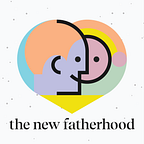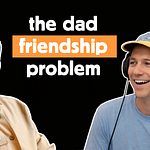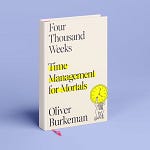The curse of a career spent in advertising is seeing everything as a problem that can easily be solved with the right strategy. Understanding what makes an audience tick; helping them find the necessary McGuffin to provide revelation and transformation needed in their own hero’s journey; figuring out how to find them, and the magic words needed to convince them they need your product.
I’ve made a living advising other people on how to do it. And then I chose to do it for myself. After two decades spent using my skills to convince people to choose one brand of toothpaste over another, or to tempt them to upgrade their phone to the newer model when the one in their pocket is working just fine, I realised I could use it for something else. Something that meant something. To use those powers for good—to seek out dads who find themselves on a path parallel to mine. To share what I’ve learned from time spent looking for answers inside, rather than chasing shiny things everywhere else. Those dads might be earlier in their quest. Perhaps they’re closing in on the finish line, if such a thing exists—a vanishing point extending into infinity. They’re all looking for something thought-provoking—and feel-provoking—along the way, and the feeling that they’re not on their own.
In the world of the “adland strategist”, the tribe of which I plied my trade, you can’t make your way through a week of this-could’ve-been-an-email meetings without someone referencing Abraham Maslow’s hierarchy of needs. This iconic, rainbow coloured pyramid helped humankind understand our motivations like never before, a career dedicated to pushing the study of the mind beyond mental illness to a place he termed humanist psychology. His work helped us understand the incentives that drive us to what we do. Maslow’s fascination with human behaviour continued into later life, and in 1966, 4 years before his death, he coined the “law of the instrument.”
“I suppose it is tempting, if the only tool you have is a hammer, to treat everything as if it were a nail."
— The Psychology of Science, Abraham Maslow
When I started The New Fatherhood last January, the urge to take a marketing hammer and use it on a literary nail was overwhelming. My brain kept cascading into AIDA funnels, bounce rates and conversion goals. The only way to make it stop was to close the valve completely:
“I spent 2021 focused on learning to write. To treat it as a craft. To give it the respect it demands. To commit to learning the way, like thousands of writers had done before me. To read more great books about writing. To read more great books, period. To get down to the nuts and bolts of language, taking the modern classics, interrogating the aspects of each sentence, unpacking their secrets, private lessons from the world’s greatest authors, often delivered from beyond the grave. I'd spend my time—as Ira Glass so eloquently put it—"closing the gap ... to make work as good as your ambitions."
It’s only over the last few months I’ve started to feel more comfortable wearing the word “writer.” Before, it was an ill-fitting jacket: tight across the back and the cuffs, baggy everywhere else, pockets exactly where you don’t want them. On the odd occasion I’d use it, privately, I’d feel achingly uncomfortable. I've written all my life, but it's always been on behalf of someone else: the company I worked for, the agency I was pitching with, the CMO’s presentation I was ghost-writing. But what you’re reading now? This is different. It’s my point of view on the world. There’s nothing to hide behind out here.
When that first notification popped up on my phone, gloriously declaring that one of you had paid $6 for this sapling of an idea, it was unlike anything I’d ever felt. I’d been paid before, for all kinds of things. But to be paid to write? One person choosing, of their own volition, to pay me—with their own money—for words I pushed onto the internet. And, if I didn't fuck things up, they’d do it again next month?
The jobs we do today are unrecognisable from the ones our parents did, fuzzier with every generation that passes—photocopies of photocopies of photocopies, a meme screenshotted so many times it’s littered with compression artefacts, a datamoshed replica of the work your great-grandad once did. Those older jobs still exist, of course. But you probably don't have one of them. My dad worked in construction. He spent the 1980s driving up and down the UK in a Transit van, through sleet, snow and shit, laying cable in the ground, getting paid by the mile. His hard labour directly correlated to a salary delivered—in cash, in a small, square, manilla envelope—on Friday evening, various deductions scrawled across the front. He’d head home on Friday evening after a week of work—probably via the pub, so say we all—with that lifeline in hand. Sometimes it would be enough to get through to next week. Other times it wouldn’t. Living week-to-week, only able to focus on the bottom layers of Maslow’s pyramid, utterly oblivious to the future he was literally paving the way for. The fibre optic cables he was installing across the country that his son would eventually use to build a career, build a life, raise a family, start a newsletter, and ultimately lead to a guy in Brighton deciding to pay him $6.
Last week, for reasons unknown, Seamus Heaney’s “Digging” paid my brain a wee visit. I haven’t read it since I studied it for my English Literature GCSE 23 years ago. Over two decades later I was dumbfounded by its predictions. A man of Irish descent, a writer of words, sits pen in hand, considering the generations of men that came before him and dug—turf for Heaney’s father, tarmacadam for mine.
“By God, the old man could handle a spade.
Just like his old man.”
Heaney remembers his father as a man who dug, wherever it took him, further and faster, as he “bends low, comes up twenty years away.” He contemplates his place amongst a lineage of strong men, who toiled for a living, exchanging their blood, sweat and fears for food and shelter for their families. He, like me, wonders if he’ll ever understand that struggle, a life spent with no a spade in hand.
“The cold smell of potato mould, the squelch and slap
Of soggy peat, the curt cuts of an edge
Through living roots awaken in my head.
But I’ve no spade to follow men like them.Between my finger and my thumb
The squat pen rests.
I’ll dig with it.”
The spade becomes a pen; the pen becomes a keyboard. Maslow’s hammer becomes a gift, a tool to climb the pyramid towards a dream of self-actualisation. The father, unwittingly, indirectly, laid the way for the son. A poem, uncovered again, 56 years after Heaney first dug it free, its roots deeper now than ever they were.
In 2010, 3 years before his death, Seamus Heaney shared thoughts from a lifetime spent under poetry’s spell.
“The difference in a poem, or a work of literary art, is that it is not utilitarian communication. It is some kind of housing of a moment—a snapshot of consciousness—that can be looked upon, by other people.”
My son turned three last Thursday. The only digging he’s seen his old man do is with a hand trowel in a window box, or with fingernails down the side of his temple on the days when it all gets too much. Will he meet this poem as a teenager, feel it woosh by at first, before boomeranging around when he’s ready for it? Will he wonder how he fits in the lineage of fathers who came before him? Will he, one day, see himself reflected in Heaney’s words, pondering the inadequacy of his spade, just as I do with mine?
Say Hello
Something a little different this week. How was it for you? Did you listen to it, and if so, how was that, and shall I do more? Your feedback helps me make this great.
Loved | Great | OK | Meh | Bad
I’ll be back next week, discussing regret with Daniel Pink. If you’d like to listen to Heaney read his poem in full, please do so here. If you enjoy The New Fatherhood, consider subscribing to support this project, and get access to the archive of member-only essays.











